BUS703: Managing Research - Leadership Coaching, Semester 1, 2018
VerifiedAdded on 2023/06/11
|9
|2132
|323
Essay
AI Summary
This essay provides a comprehensive analysis of a research article on leadership coaching, focusing on leader role efficacy (LRE) and leader's trust in subordinates (LTS). It evaluates the literature review, discusses the appropriateness of the mixed-methods research design, and critiques the data collection methods, including focus groups and questionnaires. The essay also assesses the outcomes of the research in fulfilling its objectives, particularly in generating knowledge and developing outcome criteria for assessing the effectiveness of leadership coaching. It highlights the strengths and weaknesses of the research design and suggests alternative methods, such as case study analysis, for a more in-depth theoretical understanding. The essay concludes by reflecting on how the research contributes to the understanding of leadership development and the role of coaching.
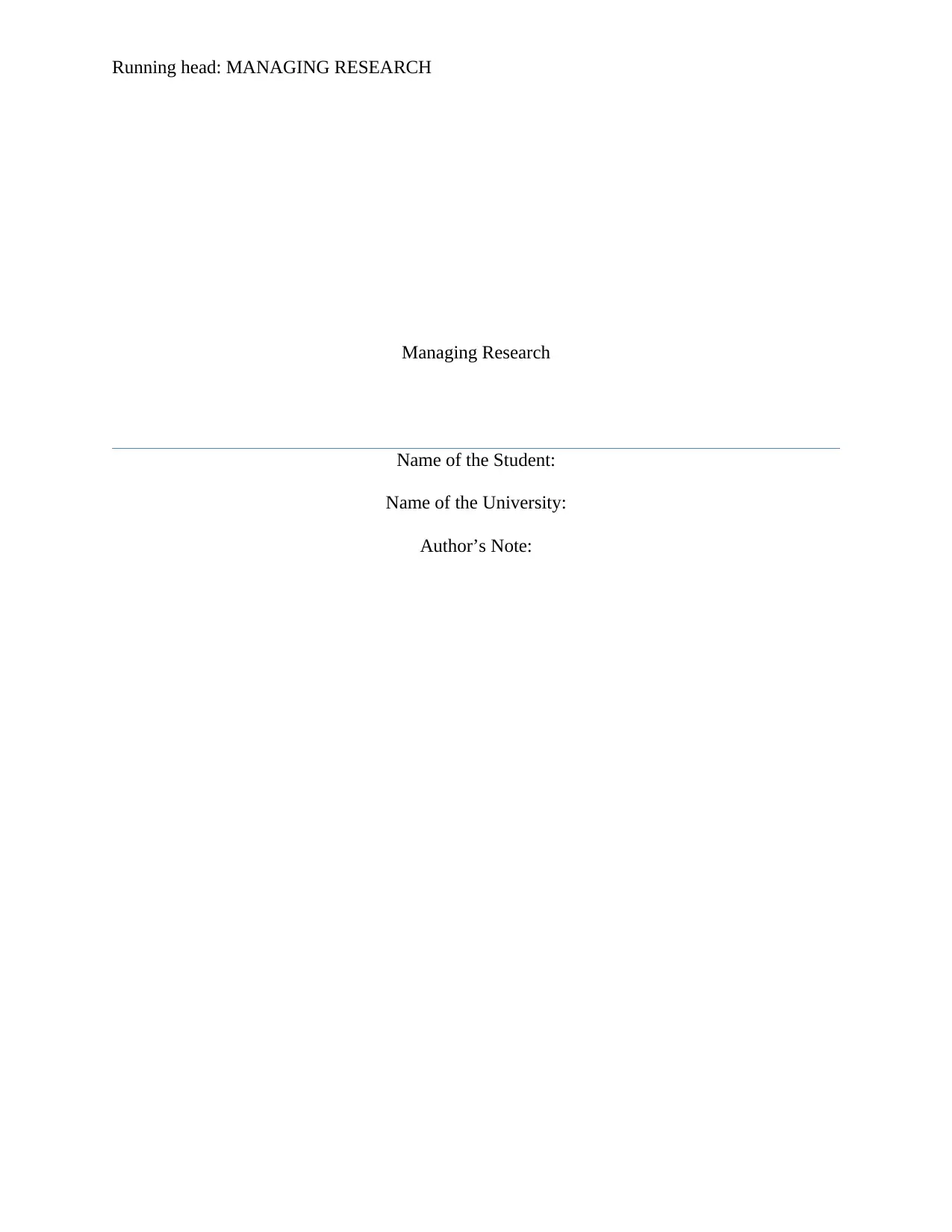
Running head: MANAGING RESEARCH
Managing Research
Name of the Student:
Name of the University:
Author’s Note:
Managing Research
Name of the Student:
Name of the University:
Author’s Note:
Paraphrase This Document
Need a fresh take? Get an instant paraphrase of this document with our AI Paraphraser
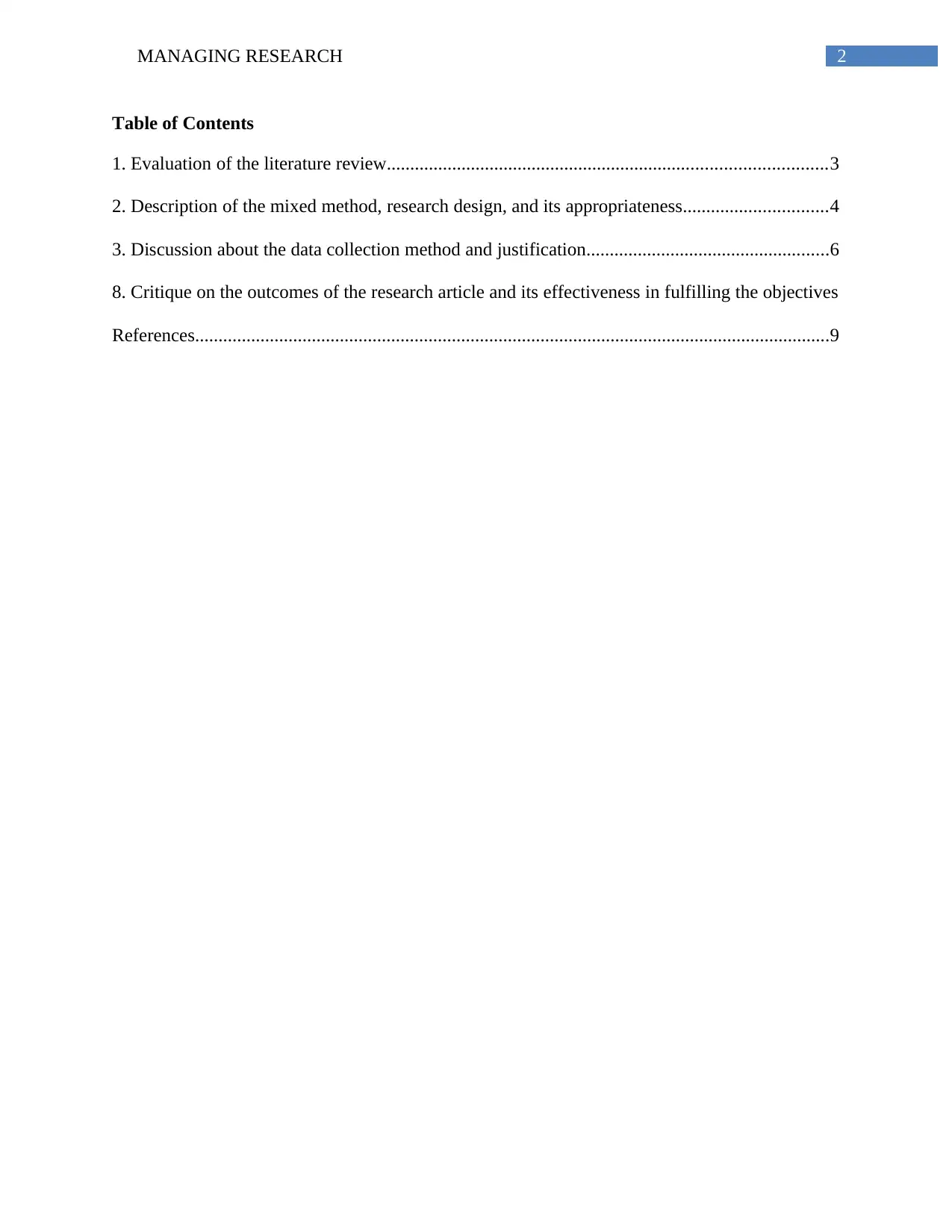
2MANAGING RESEARCH
Table of Contents
1. Evaluation of the literature review..............................................................................................3
2. Description of the mixed method, research design, and its appropriateness...............................4
3. Discussion about the data collection method and justification....................................................6
8. Critique on the outcomes of the research article and its effectiveness in fulfilling the objectives
References........................................................................................................................................9
Table of Contents
1. Evaluation of the literature review..............................................................................................3
2. Description of the mixed method, research design, and its appropriateness...............................4
3. Discussion about the data collection method and justification....................................................6
8. Critique on the outcomes of the research article and its effectiveness in fulfilling the objectives
References........................................................................................................................................9
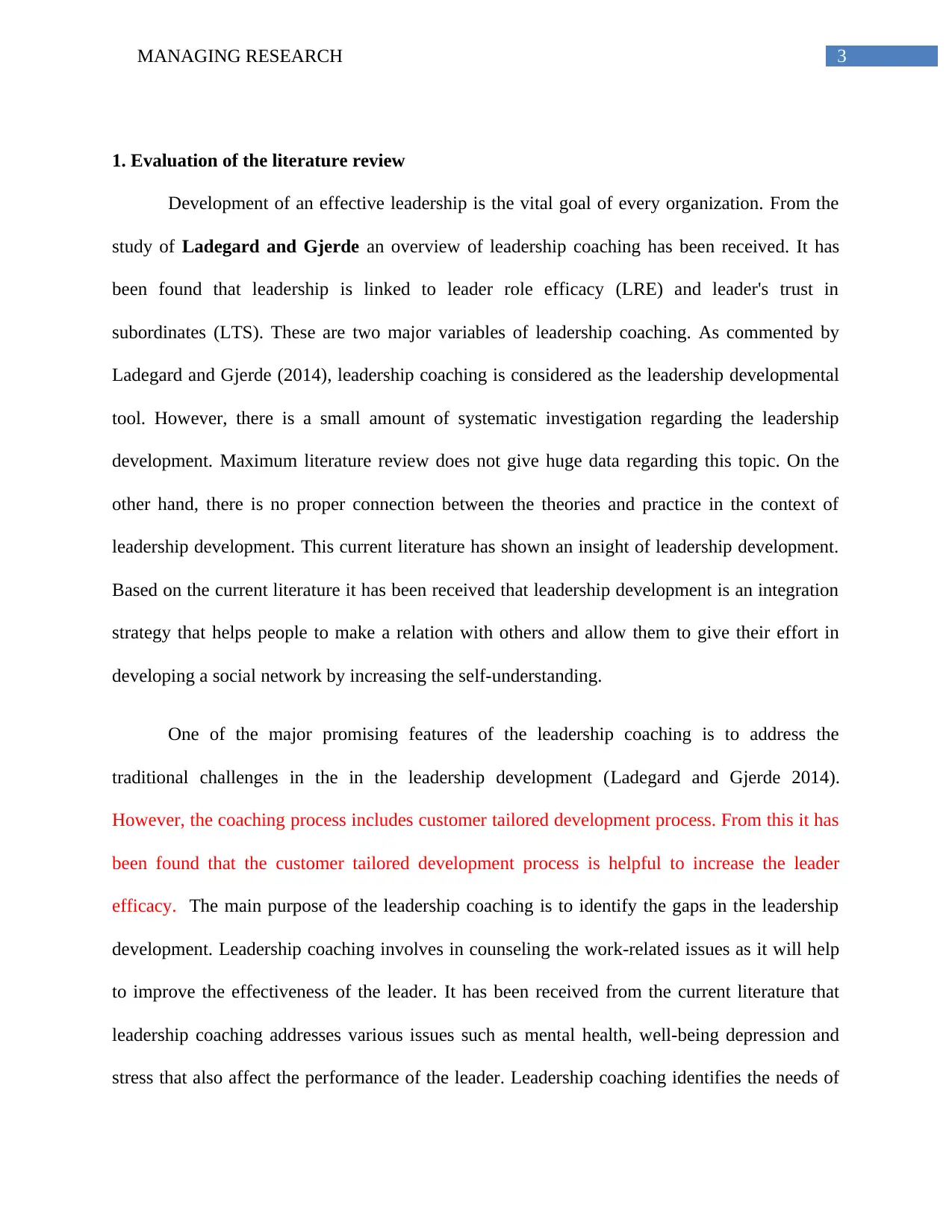
3MANAGING RESEARCH
1. Evaluation of the literature review
Development of an effective leadership is the vital goal of every organization. From the
study of Ladegard and Gjerde an overview of leadership coaching has been received. It has
been found that leadership is linked to leader role efficacy (LRE) and leader's trust in
subordinates (LTS). These are two major variables of leadership coaching. As commented by
Ladegard and Gjerde (2014), leadership coaching is considered as the leadership developmental
tool. However, there is a small amount of systematic investigation regarding the leadership
development. Maximum literature review does not give huge data regarding this topic. On the
other hand, there is no proper connection between the theories and practice in the context of
leadership development. This current literature has shown an insight of leadership development.
Based on the current literature it has been received that leadership development is an integration
strategy that helps people to make a relation with others and allow them to give their effort in
developing a social network by increasing the self-understanding.
One of the major promising features of the leadership coaching is to address the
traditional challenges in the in the leadership development (Ladegard and Gjerde 2014).
However, the coaching process includes customer tailored development process. From this it has
been found that the customer tailored development process is helpful to increase the leader
efficacy. The main purpose of the leadership coaching is to identify the gaps in the leadership
development. Leadership coaching involves in counseling the work-related issues as it will help
to improve the effectiveness of the leader. It has been received from the current literature that
leadership coaching addresses various issues such as mental health, well-being depression and
stress that also affect the performance of the leader. Leadership coaching identifies the needs of
1. Evaluation of the literature review
Development of an effective leadership is the vital goal of every organization. From the
study of Ladegard and Gjerde an overview of leadership coaching has been received. It has
been found that leadership is linked to leader role efficacy (LRE) and leader's trust in
subordinates (LTS). These are two major variables of leadership coaching. As commented by
Ladegard and Gjerde (2014), leadership coaching is considered as the leadership developmental
tool. However, there is a small amount of systematic investigation regarding the leadership
development. Maximum literature review does not give huge data regarding this topic. On the
other hand, there is no proper connection between the theories and practice in the context of
leadership development. This current literature has shown an insight of leadership development.
Based on the current literature it has been received that leadership development is an integration
strategy that helps people to make a relation with others and allow them to give their effort in
developing a social network by increasing the self-understanding.
One of the major promising features of the leadership coaching is to address the
traditional challenges in the in the leadership development (Ladegard and Gjerde 2014).
However, the coaching process includes customer tailored development process. From this it has
been found that the customer tailored development process is helpful to increase the leader
efficacy. The main purpose of the leadership coaching is to identify the gaps in the leadership
development. Leadership coaching involves in counseling the work-related issues as it will help
to improve the effectiveness of the leader. It has been received from the current literature that
leadership coaching addresses various issues such as mental health, well-being depression and
stress that also affect the performance of the leader. Leadership coaching identifies the needs of
⊘ This is a preview!⊘
Do you want full access?
Subscribe today to unlock all pages.

Trusted by 1+ million students worldwide
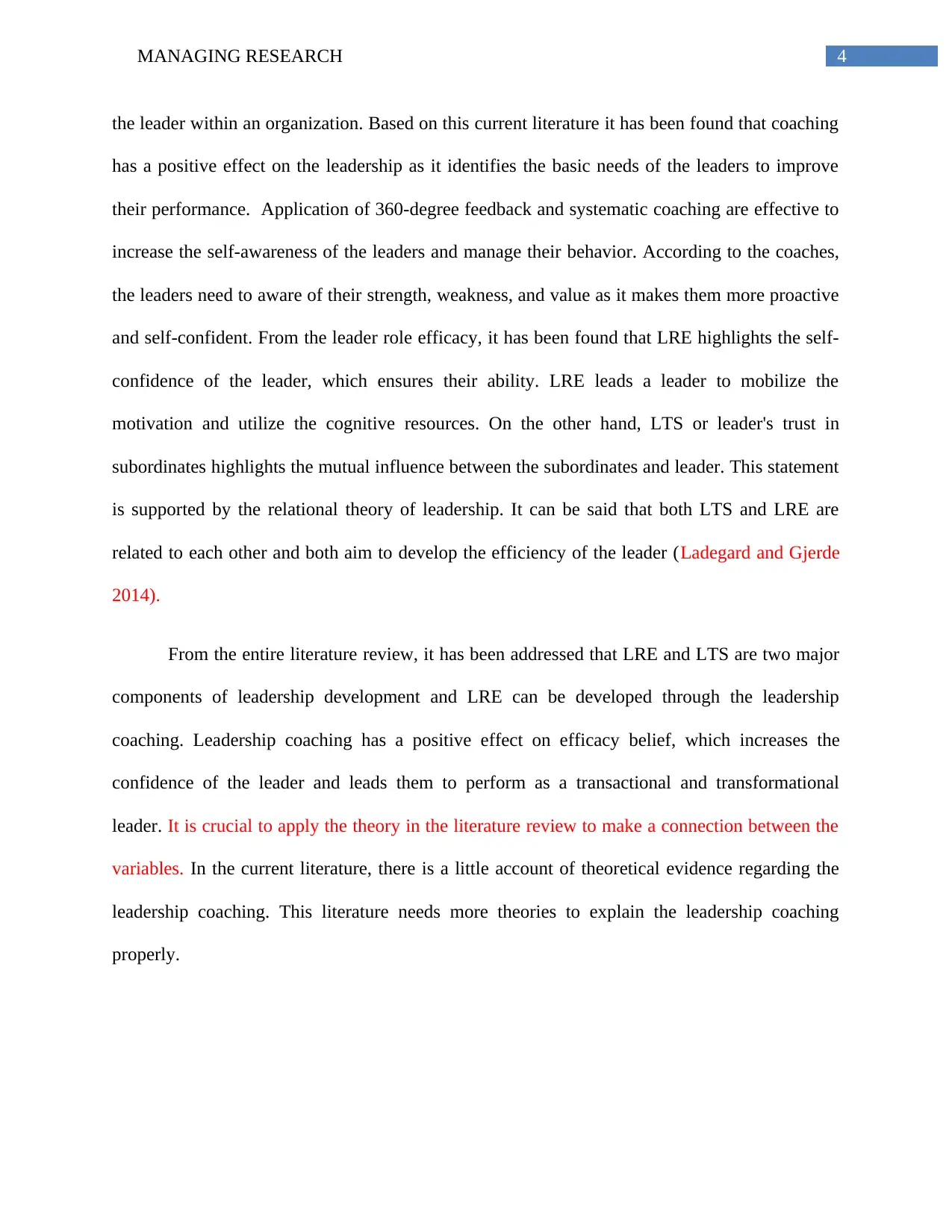
4MANAGING RESEARCH
the leader within an organization. Based on this current literature it has been found that coaching
has a positive effect on the leadership as it identifies the basic needs of the leaders to improve
their performance. Application of 360-degree feedback and systematic coaching are effective to
increase the self-awareness of the leaders and manage their behavior. According to the coaches,
the leaders need to aware of their strength, weakness, and value as it makes them more proactive
and self-confident. From the leader role efficacy, it has been found that LRE highlights the self-
confidence of the leader, which ensures their ability. LRE leads a leader to mobilize the
motivation and utilize the cognitive resources. On the other hand, LTS or leader's trust in
subordinates highlights the mutual influence between the subordinates and leader. This statement
is supported by the relational theory of leadership. It can be said that both LTS and LRE are
related to each other and both aim to develop the efficiency of the leader (Ladegard and Gjerde
2014).
From the entire literature review, it has been addressed that LRE and LTS are two major
components of leadership development and LRE can be developed through the leadership
coaching. Leadership coaching has a positive effect on efficacy belief, which increases the
confidence of the leader and leads them to perform as a transactional and transformational
leader. It is crucial to apply the theory in the literature review to make a connection between the
variables. In the current literature, there is a little account of theoretical evidence regarding the
leadership coaching. This literature needs more theories to explain the leadership coaching
properly.
the leader within an organization. Based on this current literature it has been found that coaching
has a positive effect on the leadership as it identifies the basic needs of the leaders to improve
their performance. Application of 360-degree feedback and systematic coaching are effective to
increase the self-awareness of the leaders and manage their behavior. According to the coaches,
the leaders need to aware of their strength, weakness, and value as it makes them more proactive
and self-confident. From the leader role efficacy, it has been found that LRE highlights the self-
confidence of the leader, which ensures their ability. LRE leads a leader to mobilize the
motivation and utilize the cognitive resources. On the other hand, LTS or leader's trust in
subordinates highlights the mutual influence between the subordinates and leader. This statement
is supported by the relational theory of leadership. It can be said that both LTS and LRE are
related to each other and both aim to develop the efficiency of the leader (Ladegard and Gjerde
2014).
From the entire literature review, it has been addressed that LRE and LTS are two major
components of leadership development and LRE can be developed through the leadership
coaching. Leadership coaching has a positive effect on efficacy belief, which increases the
confidence of the leader and leads them to perform as a transactional and transformational
leader. It is crucial to apply the theory in the literature review to make a connection between the
variables. In the current literature, there is a little account of theoretical evidence regarding the
leadership coaching. This literature needs more theories to explain the leadership coaching
properly.
Paraphrase This Document
Need a fresh take? Get an instant paraphrase of this document with our AI Paraphraser
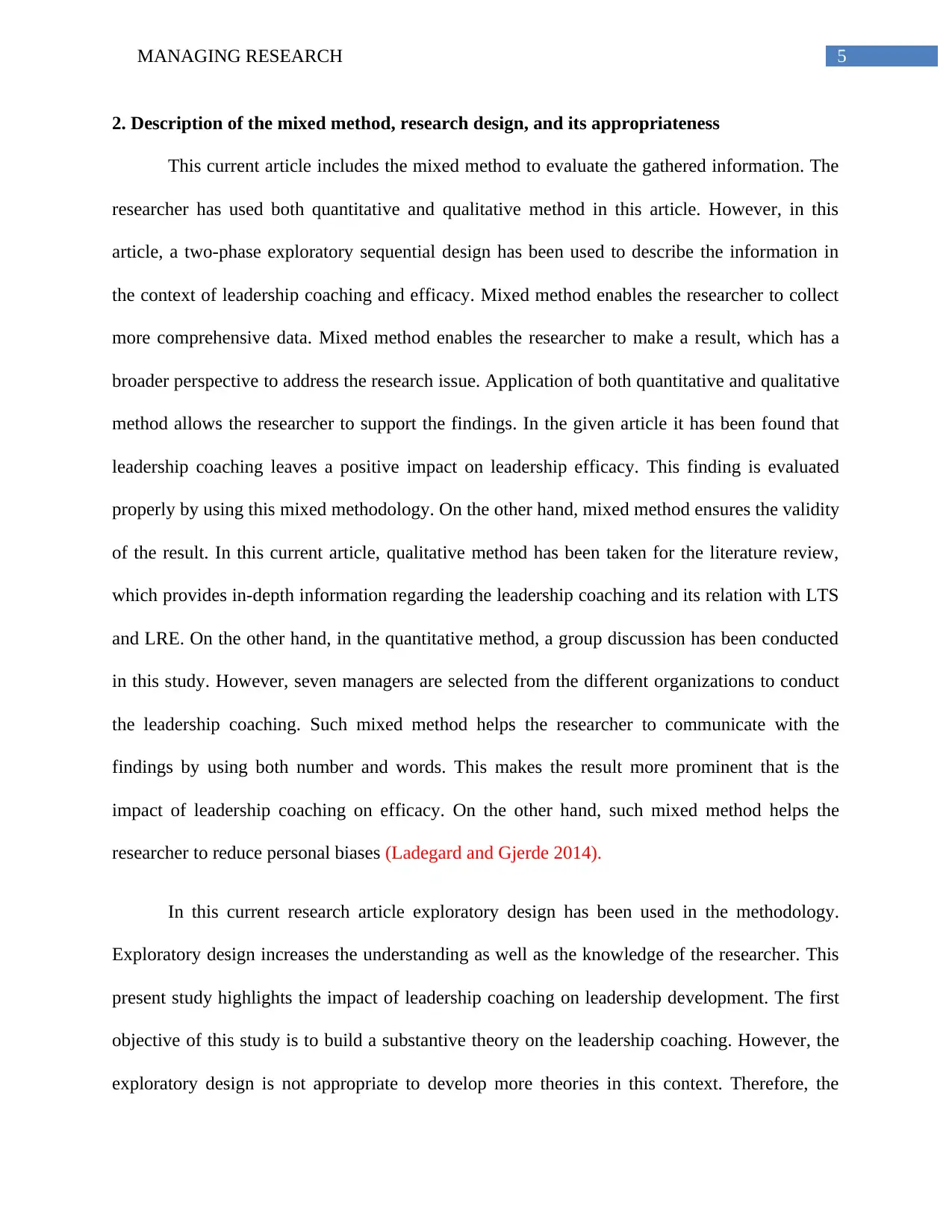
5MANAGING RESEARCH
2. Description of the mixed method, research design, and its appropriateness
This current article includes the mixed method to evaluate the gathered information. The
researcher has used both quantitative and qualitative method in this article. However, in this
article, a two-phase exploratory sequential design has been used to describe the information in
the context of leadership coaching and efficacy. Mixed method enables the researcher to collect
more comprehensive data. Mixed method enables the researcher to make a result, which has a
broader perspective to address the research issue. Application of both quantitative and qualitative
method allows the researcher to support the findings. In the given article it has been found that
leadership coaching leaves a positive impact on leadership efficacy. This finding is evaluated
properly by using this mixed methodology. On the other hand, mixed method ensures the validity
of the result. In this current article, qualitative method has been taken for the literature review,
which provides in-depth information regarding the leadership coaching and its relation with LTS
and LRE. On the other hand, in the quantitative method, a group discussion has been conducted
in this study. However, seven managers are selected from the different organizations to conduct
the leadership coaching. Such mixed method helps the researcher to communicate with the
findings by using both number and words. This makes the result more prominent that is the
impact of leadership coaching on efficacy. On the other hand, such mixed method helps the
researcher to reduce personal biases (Ladegard and Gjerde 2014).
In this current research article exploratory design has been used in the methodology.
Exploratory design increases the understanding as well as the knowledge of the researcher. This
present study highlights the impact of leadership coaching on leadership development. The first
objective of this study is to build a substantive theory on the leadership coaching. However, the
exploratory design is not appropriate to develop more theories in this context. Therefore, the
2. Description of the mixed method, research design, and its appropriateness
This current article includes the mixed method to evaluate the gathered information. The
researcher has used both quantitative and qualitative method in this article. However, in this
article, a two-phase exploratory sequential design has been used to describe the information in
the context of leadership coaching and efficacy. Mixed method enables the researcher to collect
more comprehensive data. Mixed method enables the researcher to make a result, which has a
broader perspective to address the research issue. Application of both quantitative and qualitative
method allows the researcher to support the findings. In the given article it has been found that
leadership coaching leaves a positive impact on leadership efficacy. This finding is evaluated
properly by using this mixed methodology. On the other hand, mixed method ensures the validity
of the result. In this current article, qualitative method has been taken for the literature review,
which provides in-depth information regarding the leadership coaching and its relation with LTS
and LRE. On the other hand, in the quantitative method, a group discussion has been conducted
in this study. However, seven managers are selected from the different organizations to conduct
the leadership coaching. Such mixed method helps the researcher to communicate with the
findings by using both number and words. This makes the result more prominent that is the
impact of leadership coaching on efficacy. On the other hand, such mixed method helps the
researcher to reduce personal biases (Ladegard and Gjerde 2014).
In this current research article exploratory design has been used in the methodology.
Exploratory design increases the understanding as well as the knowledge of the researcher. This
present study highlights the impact of leadership coaching on leadership development. The first
objective of this study is to build a substantive theory on the leadership coaching. However, the
exploratory design is not appropriate to develop more theories in this context. Therefore, the
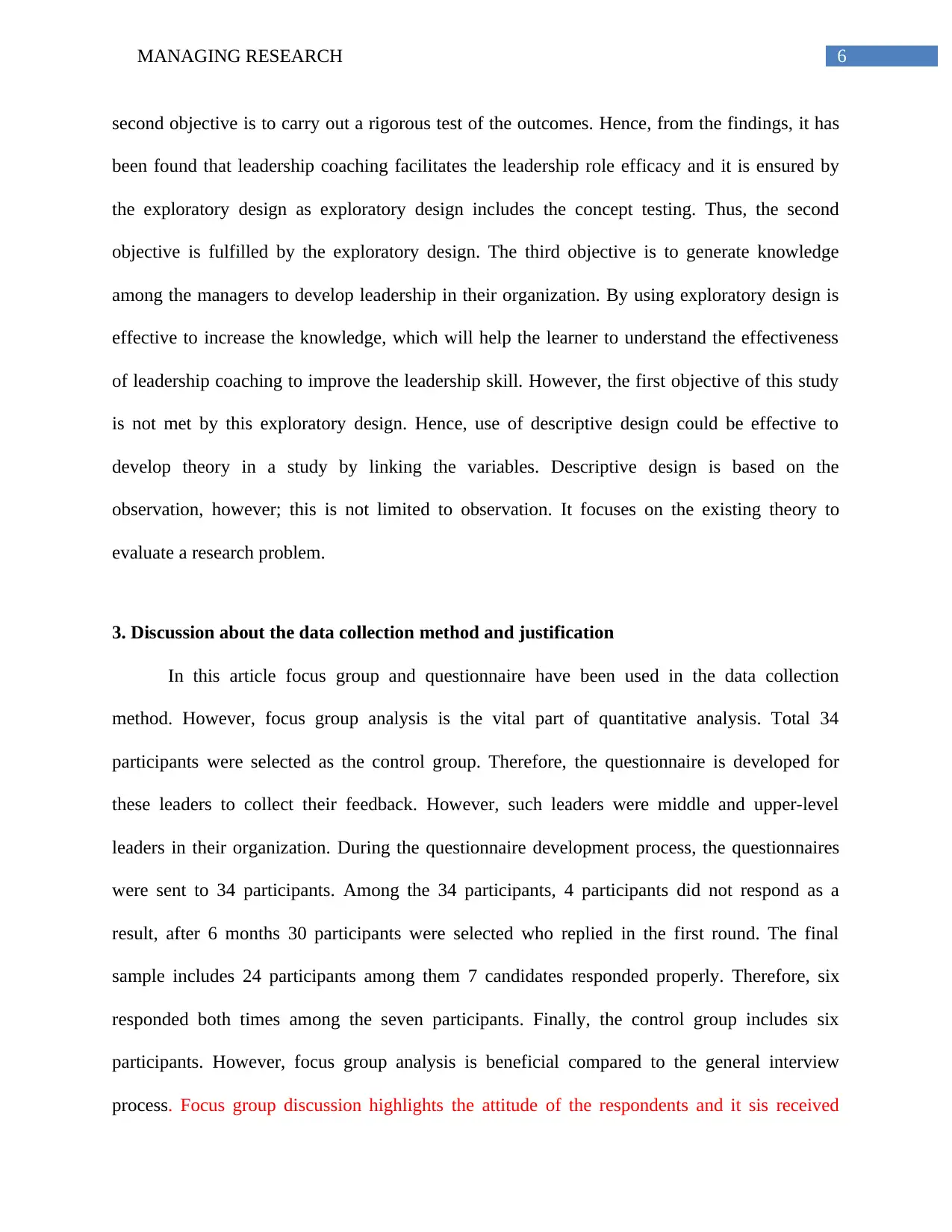
6MANAGING RESEARCH
second objective is to carry out a rigorous test of the outcomes. Hence, from the findings, it has
been found that leadership coaching facilitates the leadership role efficacy and it is ensured by
the exploratory design as exploratory design includes the concept testing. Thus, the second
objective is fulfilled by the exploratory design. The third objective is to generate knowledge
among the managers to develop leadership in their organization. By using exploratory design is
effective to increase the knowledge, which will help the learner to understand the effectiveness
of leadership coaching to improve the leadership skill. However, the first objective of this study
is not met by this exploratory design. Hence, use of descriptive design could be effective to
develop theory in a study by linking the variables. Descriptive design is based on the
observation, however; this is not limited to observation. It focuses on the existing theory to
evaluate a research problem.
3. Discussion about the data collection method and justification
In this article focus group and questionnaire have been used in the data collection
method. However, focus group analysis is the vital part of quantitative analysis. Total 34
participants were selected as the control group. Therefore, the questionnaire is developed for
these leaders to collect their feedback. However, such leaders were middle and upper-level
leaders in their organization. During the questionnaire development process, the questionnaires
were sent to 34 participants. Among the 34 participants, 4 participants did not respond as a
result, after 6 months 30 participants were selected who replied in the first round. The final
sample includes 24 participants among them 7 candidates responded properly. Therefore, six
responded both times among the seven participants. Finally, the control group includes six
participants. However, focus group analysis is beneficial compared to the general interview
process. Focus group discussion highlights the attitude of the respondents and it sis received
second objective is to carry out a rigorous test of the outcomes. Hence, from the findings, it has
been found that leadership coaching facilitates the leadership role efficacy and it is ensured by
the exploratory design as exploratory design includes the concept testing. Thus, the second
objective is fulfilled by the exploratory design. The third objective is to generate knowledge
among the managers to develop leadership in their organization. By using exploratory design is
effective to increase the knowledge, which will help the learner to understand the effectiveness
of leadership coaching to improve the leadership skill. However, the first objective of this study
is not met by this exploratory design. Hence, use of descriptive design could be effective to
develop theory in a study by linking the variables. Descriptive design is based on the
observation, however; this is not limited to observation. It focuses on the existing theory to
evaluate a research problem.
3. Discussion about the data collection method and justification
In this article focus group and questionnaire have been used in the data collection
method. However, focus group analysis is the vital part of quantitative analysis. Total 34
participants were selected as the control group. Therefore, the questionnaire is developed for
these leaders to collect their feedback. However, such leaders were middle and upper-level
leaders in their organization. During the questionnaire development process, the questionnaires
were sent to 34 participants. Among the 34 participants, 4 participants did not respond as a
result, after 6 months 30 participants were selected who replied in the first round. The final
sample includes 24 participants among them 7 candidates responded properly. Therefore, six
responded both times among the seven participants. Finally, the control group includes six
participants. However, focus group analysis is beneficial compared to the general interview
process. Focus group discussion highlights the attitude of the respondents and it sis received
⊘ This is a preview!⊘
Do you want full access?
Subscribe today to unlock all pages.

Trusted by 1+ million students worldwide
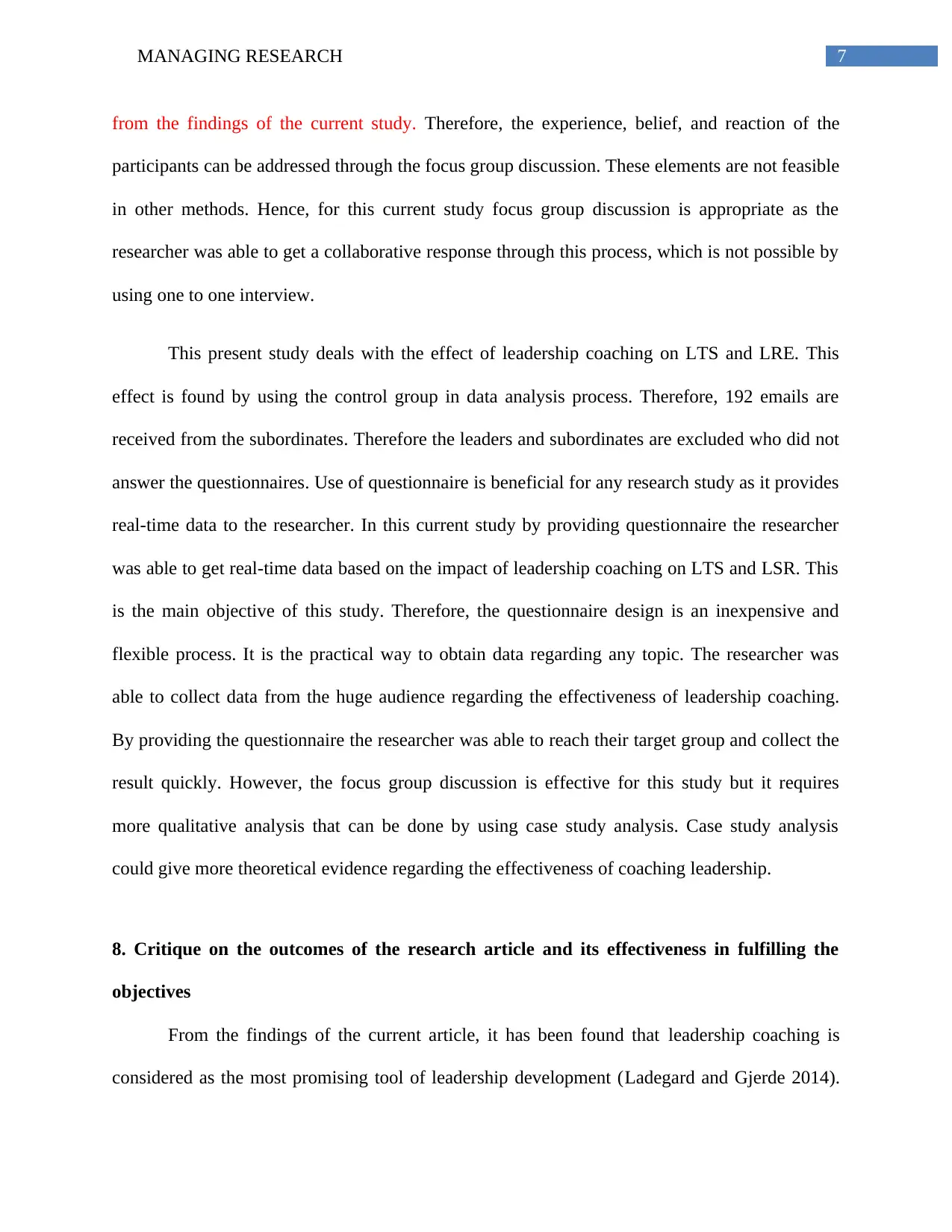
7MANAGING RESEARCH
from the findings of the current study. Therefore, the experience, belief, and reaction of the
participants can be addressed through the focus group discussion. These elements are not feasible
in other methods. Hence, for this current study focus group discussion is appropriate as the
researcher was able to get a collaborative response through this process, which is not possible by
using one to one interview.
This present study deals with the effect of leadership coaching on LTS and LRE. This
effect is found by using the control group in data analysis process. Therefore, 192 emails are
received from the subordinates. Therefore the leaders and subordinates are excluded who did not
answer the questionnaires. Use of questionnaire is beneficial for any research study as it provides
real-time data to the researcher. In this current study by providing questionnaire the researcher
was able to get real-time data based on the impact of leadership coaching on LTS and LSR. This
is the main objective of this study. Therefore, the questionnaire design is an inexpensive and
flexible process. It is the practical way to obtain data regarding any topic. The researcher was
able to collect data from the huge audience regarding the effectiveness of leadership coaching.
By providing the questionnaire the researcher was able to reach their target group and collect the
result quickly. However, the focus group discussion is effective for this study but it requires
more qualitative analysis that can be done by using case study analysis. Case study analysis
could give more theoretical evidence regarding the effectiveness of coaching leadership.
8. Critique on the outcomes of the research article and its effectiveness in fulfilling the
objectives
From the findings of the current article, it has been found that leadership coaching is
considered as the most promising tool of leadership development (Ladegard and Gjerde 2014).
from the findings of the current study. Therefore, the experience, belief, and reaction of the
participants can be addressed through the focus group discussion. These elements are not feasible
in other methods. Hence, for this current study focus group discussion is appropriate as the
researcher was able to get a collaborative response through this process, which is not possible by
using one to one interview.
This present study deals with the effect of leadership coaching on LTS and LRE. This
effect is found by using the control group in data analysis process. Therefore, 192 emails are
received from the subordinates. Therefore the leaders and subordinates are excluded who did not
answer the questionnaires. Use of questionnaire is beneficial for any research study as it provides
real-time data to the researcher. In this current study by providing questionnaire the researcher
was able to get real-time data based on the impact of leadership coaching on LTS and LSR. This
is the main objective of this study. Therefore, the questionnaire design is an inexpensive and
flexible process. It is the practical way to obtain data regarding any topic. The researcher was
able to collect data from the huge audience regarding the effectiveness of leadership coaching.
By providing the questionnaire the researcher was able to reach their target group and collect the
result quickly. However, the focus group discussion is effective for this study but it requires
more qualitative analysis that can be done by using case study analysis. Case study analysis
could give more theoretical evidence regarding the effectiveness of coaching leadership.
8. Critique on the outcomes of the research article and its effectiveness in fulfilling the
objectives
From the findings of the current article, it has been found that leadership coaching is
considered as the most promising tool of leadership development (Ladegard and Gjerde 2014).
Paraphrase This Document
Need a fresh take? Get an instant paraphrase of this document with our AI Paraphraser
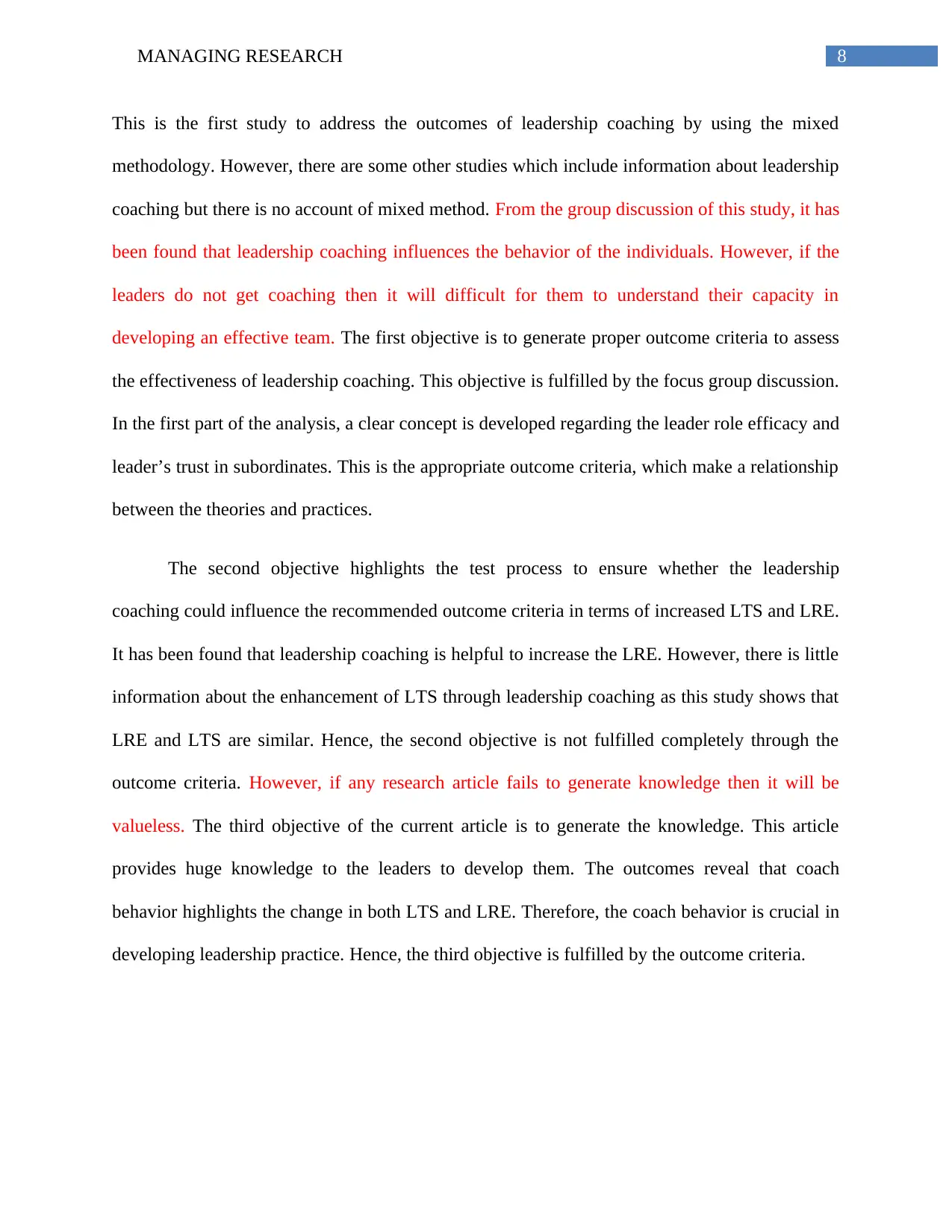
8MANAGING RESEARCH
This is the first study to address the outcomes of leadership coaching by using the mixed
methodology. However, there are some other studies which include information about leadership
coaching but there is no account of mixed method. From the group discussion of this study, it has
been found that leadership coaching influences the behavior of the individuals. However, if the
leaders do not get coaching then it will difficult for them to understand their capacity in
developing an effective team. The first objective is to generate proper outcome criteria to assess
the effectiveness of leadership coaching. This objective is fulfilled by the focus group discussion.
In the first part of the analysis, a clear concept is developed regarding the leader role efficacy and
leader’s trust in subordinates. This is the appropriate outcome criteria, which make a relationship
between the theories and practices.
The second objective highlights the test process to ensure whether the leadership
coaching could influence the recommended outcome criteria in terms of increased LTS and LRE.
It has been found that leadership coaching is helpful to increase the LRE. However, there is little
information about the enhancement of LTS through leadership coaching as this study shows that
LRE and LTS are similar. Hence, the second objective is not fulfilled completely through the
outcome criteria. However, if any research article fails to generate knowledge then it will be
valueless. The third objective of the current article is to generate the knowledge. This article
provides huge knowledge to the leaders to develop them. The outcomes reveal that coach
behavior highlights the change in both LTS and LRE. Therefore, the coach behavior is crucial in
developing leadership practice. Hence, the third objective is fulfilled by the outcome criteria.
This is the first study to address the outcomes of leadership coaching by using the mixed
methodology. However, there are some other studies which include information about leadership
coaching but there is no account of mixed method. From the group discussion of this study, it has
been found that leadership coaching influences the behavior of the individuals. However, if the
leaders do not get coaching then it will difficult for them to understand their capacity in
developing an effective team. The first objective is to generate proper outcome criteria to assess
the effectiveness of leadership coaching. This objective is fulfilled by the focus group discussion.
In the first part of the analysis, a clear concept is developed regarding the leader role efficacy and
leader’s trust in subordinates. This is the appropriate outcome criteria, which make a relationship
between the theories and practices.
The second objective highlights the test process to ensure whether the leadership
coaching could influence the recommended outcome criteria in terms of increased LTS and LRE.
It has been found that leadership coaching is helpful to increase the LRE. However, there is little
information about the enhancement of LTS through leadership coaching as this study shows that
LRE and LTS are similar. Hence, the second objective is not fulfilled completely through the
outcome criteria. However, if any research article fails to generate knowledge then it will be
valueless. The third objective of the current article is to generate the knowledge. This article
provides huge knowledge to the leaders to develop them. The outcomes reveal that coach
behavior highlights the change in both LTS and LRE. Therefore, the coach behavior is crucial in
developing leadership practice. Hence, the third objective is fulfilled by the outcome criteria.
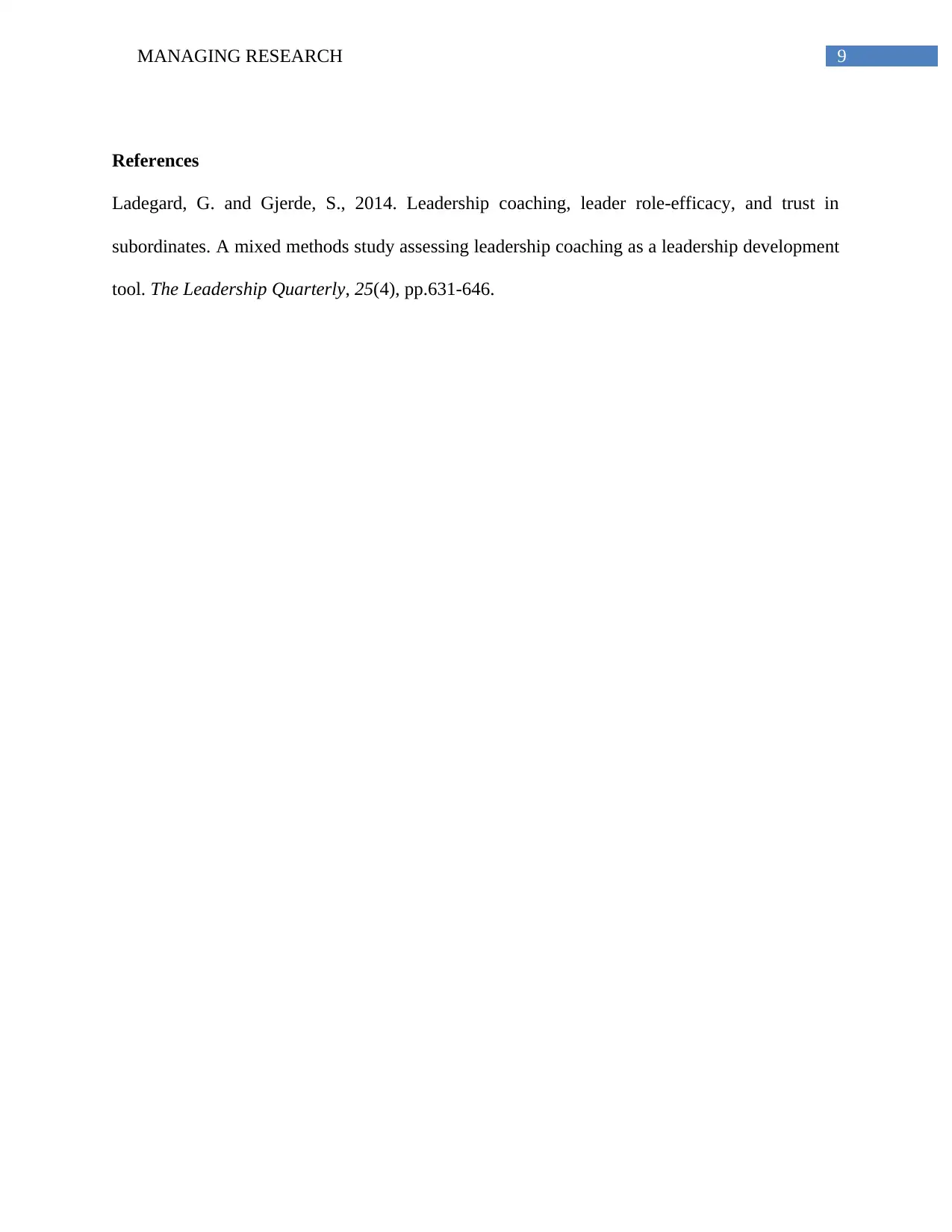
9MANAGING RESEARCH
References
Ladegard, G. and Gjerde, S., 2014. Leadership coaching, leader role-efficacy, and trust in
subordinates. A mixed methods study assessing leadership coaching as a leadership development
tool. The Leadership Quarterly, 25(4), pp.631-646.
References
Ladegard, G. and Gjerde, S., 2014. Leadership coaching, leader role-efficacy, and trust in
subordinates. A mixed methods study assessing leadership coaching as a leadership development
tool. The Leadership Quarterly, 25(4), pp.631-646.
⊘ This is a preview!⊘
Do you want full access?
Subscribe today to unlock all pages.

Trusted by 1+ million students worldwide
1 out of 9
Related Documents
Your All-in-One AI-Powered Toolkit for Academic Success.
+13062052269
info@desklib.com
Available 24*7 on WhatsApp / Email
![[object Object]](/_next/static/media/star-bottom.7253800d.svg)
Unlock your academic potential
Copyright © 2020–2025 A2Z Services. All Rights Reserved. Developed and managed by ZUCOL.




